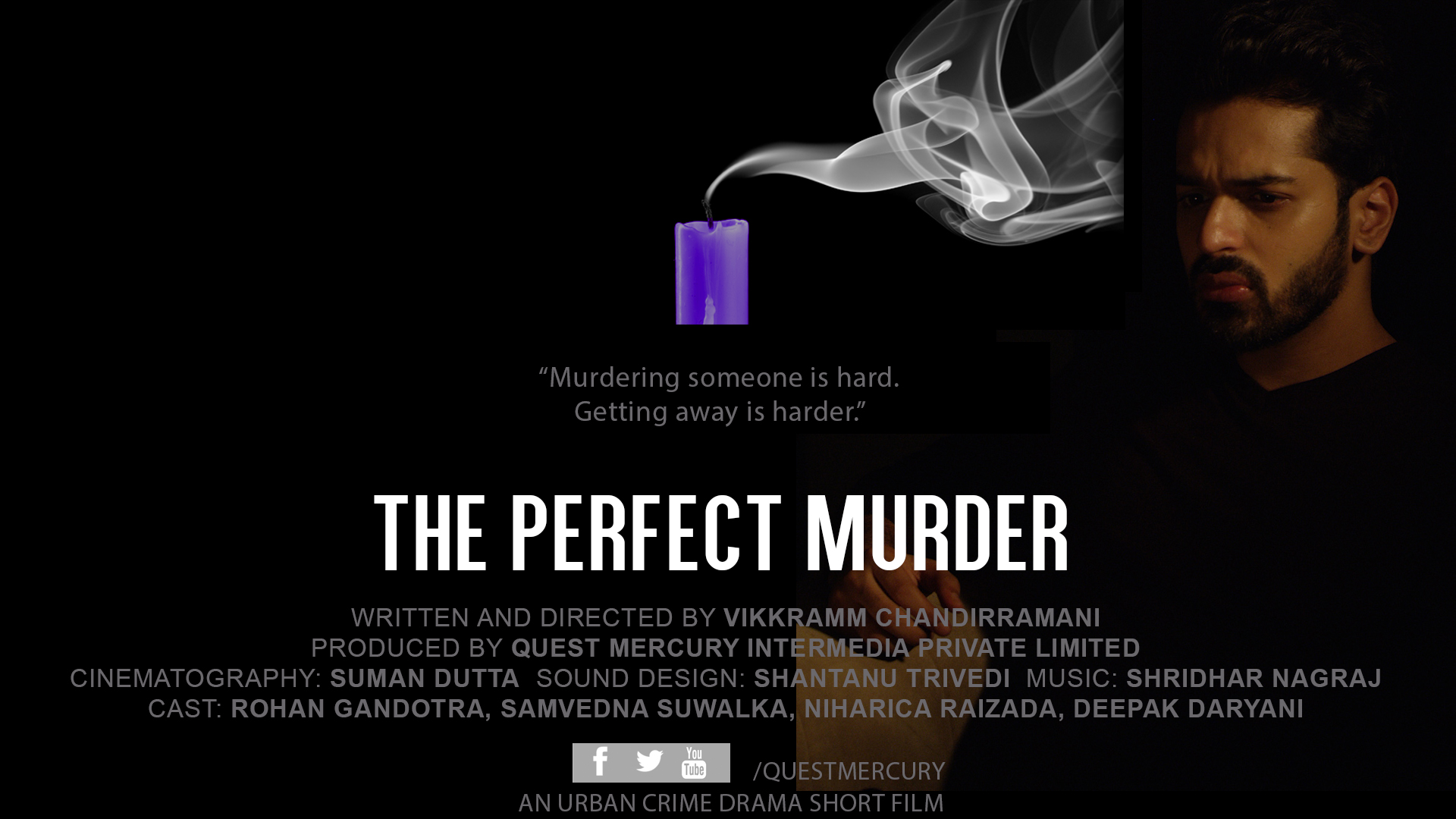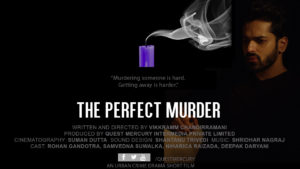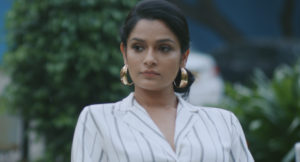
India Independent Short Film Review “The Perfect Murder”
WATCH THE TRAILER HERE
First, the Recap:
Being in a bind. We like to believe that the best laid plans will come about without a hitch, no complications, smoothly executed so as to assure the best possible results as intended. Yet, when the plans in question are of a more–nefarious–nature, how can this normally established expectation ever arrive as anticipated? Suddenly, the longed for outcome may no longer be so straightforward. With the announcement by her doctor (Deepak Daryani) that a heart condition might keep her from closing an important business deal, a woman named Neha (Samvedna Suwalka) finds herself at odds with her own sense of desperation while attempting to find the true support she needs from her struggling actor husband, Kabir (Rohan Gandotra).
Arguing that he has a highly important film-related deal going during the time the pair is supposed to be exploring the final aspects of Neha’s business deal, Kabir is then at odds with her over the directions his career has not accomplished even as Neha continues to try and impress upon him he’d be better off as a businessman than a failing thespian. Angered and frustrated, much less being in personal financial crisis if it wasn’t for Neha’s affluent family, Kabir makes a fateful choice to take care of the entire dilemma through a scheme hatched with his mistress Carol (Niharica Raizada). However, thinking everything is in place and it actually being true soon becomes a completely different, potentially tragic, situation.
Next, my Mind:
It is hard not to beg the primary question “When we people ever learn that perpetrating evil acts never has the positive outcome they desire?” when it comes to this 18-minute indie short film effort from writer/director/producer/editor Vikkramm Chandirramani. Tackling not only this notion but likewise delving into concepts that explore our greedy, selfish natures, the false “power” of seeking money as satisfaction, feeling devalued by someone we love, a general look at the myriad of facets that make up relationships, the sometimes blinding quality of ambition, the unsettledness within ourselves when not getting what we feel we’ve earned, letting circumstances that are less than ideal unduly influence our minds and therefore, subsequently, our actions, and the mistaken idea that taking drastic measures instead of being forthright and working things out leads to some better place we’d rather be, it’s all a part of the greater narrative here and honestly could be seen as a seriously compelling life lesson to be considered, even if the events here are to the extreme.
But then again, have we not heard of this level of wrongly placed obsession and misplaced desire in real life? Perhaps these postulations are not so far-fetched at all, but an actual interpretive reflection of what darkness and inwardly dissatisfied souls reside inside us when we allow these kinds of factors to dominate our very being instead of love, understanding, faithfulness, and integrity being the driving forces. The ramifications of rash actions is very clearly displayed here within every moment the trio of primary antagonists as we can at least, perhaps, empathize a little with each of them from the standpoint that ultimately, they’re all looking to simply live fulfilled, complete, happy lives yet end up demonstrating how none of them have the inner serenity to really see it happen in constructive ways, though one could argue that at least Neha does possess the most even-handed, logical, grounded approach to the proceedings. Visually the film accompanies the narrative with smooth, clean, clear camera work in a way the, to this critic, continues to belie the indie nature of the film itself, which also only goes to illustrate that indie film should no longer be considered some “cheap” imitation of major filmmaking.
Suwalka delivers a solidly believable and quietly earnest performance in her role as Neha, a woman we can tell is greatly motivated to achieve the level of success her family history and fortune speak to, but not at the cost of following her heart when it comes to having married Kabir, a move she met resistance from. Her insistence that Kabir realize how, supposedly, futile his acting pursuit has been and will be might come from a place of sincere concern, yet it’s a little hard to think her own aspirations and intent might cloud supporting her husband more than she has. Still, it is evident love is true from her towards him, and her mild to blatant frustrations with him are only tempered with this modicum of control she maintains, despite the medical condition that remains an underlying specter for her. Knowing Kabir’s flaws might go hand in hand with accepting her own weaknesses, but she doesn’t necessarily show it, even though we get the feeling she’s always known there are issue between them that have gone unheeded, or not dealt with. Suwalka makes us experience this mix of turmoil and genuine, almost desperate desire the character has to see things pan out for the pair with beautiful poise and grace.
Gandotra chooses a worthy pairing of inwardly burning intensity with an unexpected level of vulnerability in portraying Kabir, a man certainly adamant and driven towards his own agenda when it comes to the career in film he’s worked at for many years, even despite not scoring true success, wanting to maintain what he sees as momentum but his wife Neha sees as a stalled experiment that will never actually yield fruit. We clearly witness the hurt this strikes Kabir with, especially given the source the negativity is emanating from, but then we still end up finding out that rather than making real efforts to rectify things in a beneficial way with her, he either bows to her stronger personality or shows indications of lashing out, much less revealing his already impaired judgment in having the dalliance he sustains as a coping device. But, this unguarded state of being along with pressure being placed on him by Carol as well all leads to him not remotely taking time to think through his decisions or the elements of the situations around him, culminating in poor “solution” to the problem. Throughout, Gandotra excellently enacts the sadness and anger his character faces with wonderful gravitas and impact.
The third component to this corrupted tale is brought into being by the impassioned performance of Raizada as Kabir’s ill-chosen affair Carol, a woman whom we pretty much get the instant impression is, quite frankly, a gold digger and really has stars in her eyes and dreams of money in her heart, wanting to know the opulent life, and therefore demanding it of Kabir, who’s made the wrong resolution in promising her something that he believes he can get, but not in the way or timeframe she wants, much less not having any inclination to feel used by Kabir rather than treasured. As their purely physical addiction keeps getting chased along the way, though, one does start to wonder just how Kabir has ended up under the control of two women and their respective aims, with one for his benefit and the other, well, we’re not so sure at times. Adding to events, a revelation Carol advises Kabir of only makes things even more deeply tangled and thorny between the two, more so causing him to choose the path he already has, but now is in a panic over. It’s a diverse yet uncomplicated character, and Raizada utilizes every moment of screen time effectively to showcase really how unhinged and manipulative Carol really is.
Supporting turns are brought to the story by Daryani as Neha’s doctor and Nirmohi Mali as a local plumber. In total, “The Perfect Murder” is a well-presented, character-driven, strongly dramatic effort that assuredly reminds us of the fragile psyche of people under immense, even if unspoken, pressure that propels them to take reckless, impulsive, and often destructive roads which can only climax in heartache, broken bonds, and, sometimes, more permanent ends.
As always, this is all for your consideration and comment. Until next time, thank you for reading!






Permalink